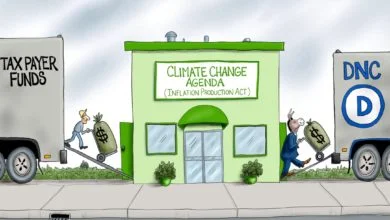9 Crazy Examples of Waste, Unrelated Pet Projects Snuck into Massive Bipartisan Infrastructure Bill
When President Biden first unveiled his $2+ trillion proposal for an infrastructure spending package, he was widely ridiculed for stretching the meaning of the word “infrastructure” far past its breaking point. The legislation snuck in climate change policy, billions for woke diversity initiatives, massive funding for public schools, and much more under creatively deceptive guises such as “human infrastructure.” Thankfully, this package didn’t get far.
However, more feasible efforts continue from a bipartisan group of senators seeking to pass a $1 trillion infrastructure compromise package. This legislative effort does, in fairness, stay much closer to the traditionally understood definition of infrastructure with its funding for roads, bridges, and more. Yet even this supposedly moderate, reasonable bill is 2,702 pages in length, leaving ample room for lobbyists and individual politicians to slip in wasteful items and crony pet projects.
Here are nine examples of seemingly unrelated, wasteful, or otherwise dubious spending programs snuck into the thousands of pages of legislative text.
1. Invasive Plant Elimination Program
The legislation includes $50 million in annual funding to “provide grants to States to eliminate or control existing invasive plants or prevent introduction of or encroachment by new invasive plants along and in areas adjacent to transportation corridor rights-of-way.”
2. Study on ‘Stormwater Best Management Practices’
The bill includes funding and authorization for a study on how best to manage stormwater.
3. A Commission to Promote ‘Women in the Trucking Industry’
The infrastructure bill creates a commission to address the alleged sexist underrepresentation of women in the trucking industry.
4. Millions for ‘Fish Restoration’ and ‘Recreational Boating Safety’
The legislation authorizes $12,786,434 in annual funding for “sport fish restoration” and “recreational boating safety.”
5. Funding for ‘Pollinator-Friendly Practices’ on Roadsides
The bill would allocate $2 million annually for “a program to provide grants to eligible entities to carry out activities to benefit pollinators on roadsides and highway rights-of-way, including the planting and seeding of native, locally-appropriate grasses and wildflowers, including milkweed.”
6. Improving Sanitation in Rural and Native Alaskan Villages
The legislation sets aside $40+ million in annual funding for grants to improve sanitation in Alaskan villages.
7. Cash for Public School Improvement Projects
The bill sets aside $500 million to be spent from 2022 to 2026 on extremely vaguely defined improvement projects in public schools that increase “energy efficiency.”
8. Funding for Refurbishing Household Wastewater Systems
The legislation allocates $50 million annually to go toward “grants for construction and refurbishing of individual household decentralized wastewater systems for individuals with low or moderate income.”
9. Creation of an ‘Energy and Minerals Research Facility’
The bill allocates a whopping $167 million for the creation, in partnership with an academic institution, of a government “facility to support energy and minerals research and [pertinent] associated structures.”
Just the Tip of the Iceberg
Don’t think for a moment that the above nine examples are the only wasteful or questionable items in this bill. They are simply what one reporter could find in a few hours. Buried in the 2,702 pages are no doubt many, many more similar items, and the entire legislation would take an entire team of reporters weeks to comb through.
But maybe that’s exactly the point.
The Takeaway
Whether one supports this new infrastructure bill or not is a broader question that requires adjudicating the proper federal role in infrastructure funding and the (rather dismal) state of our public finance. But the waste and bizarre expenditures slipped into this legislation demonstrate a broader principle: Any time centralized government officials come together to dole out trillions in taxpayer dollars, waste, inefficiency, and corruption are baked into the cake. And that’s worth remembering in future debates far beyond infrastructure.
Like this story? Click here to sign up for the FEE Daily and get free-market news and analysis like this from Policy Correspondent Brad Polumbo in your inbox every weekday.
This article was originally published on FEE.org



